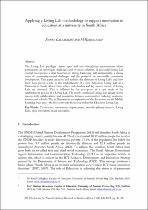 ResearchSpace
ResearchSpace
Applying a Living Lab methodology to support innovation in education at a university in South Africa
JavaScript is disabled for your browser. Some features of this site may not work without it.
- ResearchSpace
- →
- Research Publications/Outputs
- →
- Journal Articles
- →
- View Item
| dc.contributor.author |
Gallaghan, R

|
|
| dc.contributor.author |
Herselman, Martha E

|
|
| dc.date.accessioned | 2015-12-18T12:27:09Z | |
| dc.date.available | 2015-12-18T12:27:09Z | |
| dc.date.issued | 2015-07 | |
| dc.identifier.citation | Gallaghan, R and Herselman, M. 2015. Applying a living lab methodology to support innovation in education at a university in South Africa. Journal for Transdisciplinary Research in Southern Africa, vol 11(1), pp. 21-38 | en_US |
| dc.identifier.issn | 1817-4434 | |
| dc.identifier.uri | http://reference.sabinet.co.za/document/EJC174494 | |
| dc.identifier.uri | http://hdl.handle.net/10204/8317 | |
| dc.description | Copyright: 2015 Sabinet Online Ltd | en_US |
| dc.description.abstract | The Living Lab paradigm creates open and inter-disciplinary environments where participants can interrogate challenges and co-create solutions. A successful Living Lab context incorporates a clear focus/vision, strong leadership, self-sustainability, a strong sense of community-owned challenges and the potential for sustainable community development. This paper discusses and outlines the elements of Living Labs, and how these have played a role in the establishment of a new Education Living Lab at a University in South Africa. Core values, stakeholders and key success factors of Living Labs are discussed. This is followed by the description of a case study of the establishment process of a Living Lab. The newly established Living Lab already shows success with collaborations and innovation between communities, industry, academia, learners and schools. This is illustrated in an application of the discussions on the Mobile Learning focus area - the first active sub-focus area within the Education Living Lab. | en_US |
| dc.language.iso | en | en_US |
| dc.publisher | Sabinet Online Ltd | en_US |
| dc.relation.ispartofseries | Workflow;15483 | |
| dc.subject | Co-creation | en_US |
| dc.subject | Community empowerment | en_US |
| dc.subject | Interdisciplinary research | en_US |
| dc.subject | Living Labs | en_US |
| dc.subject | Open innovation | en_US |
| dc.subject | Social innovation | en_US |
| dc.title | Applying a Living Lab methodology to support innovation in education at a university in South Africa | en_US |
| dc.type | Article | en_US |
| dc.identifier.apacitation | Gallaghan, R., & Herselman, M. E. (2015). Applying a Living Lab methodology to support innovation in education at a university in South Africa. http://hdl.handle.net/10204/8317 | en_ZA |
| dc.identifier.chicagocitation | Gallaghan, R, and Martha E Herselman "Applying a Living Lab methodology to support innovation in education at a university in South Africa." (2015) http://hdl.handle.net/10204/8317 | en_ZA |
| dc.identifier.vancouvercitation | Gallaghan R, Herselman ME. Applying a Living Lab methodology to support innovation in education at a university in South Africa. 2015; http://hdl.handle.net/10204/8317. | en_ZA |
| dc.identifier.ris | TY - Article AU - Gallaghan, R AU - Herselman, Martha E AB - The Living Lab paradigm creates open and inter-disciplinary environments where participants can interrogate challenges and co-create solutions. A successful Living Lab context incorporates a clear focus/vision, strong leadership, self-sustainability, a strong sense of community-owned challenges and the potential for sustainable community development. This paper discusses and outlines the elements of Living Labs, and how these have played a role in the establishment of a new Education Living Lab at a University in South Africa. Core values, stakeholders and key success factors of Living Labs are discussed. This is followed by the description of a case study of the establishment process of a Living Lab. The newly established Living Lab already shows success with collaborations and innovation between communities, industry, academia, learners and schools. This is illustrated in an application of the discussions on the Mobile Learning focus area - the first active sub-focus area within the Education Living Lab. DA - 2015-07 DB - ResearchSpace DP - CSIR KW - Co-creation KW - Community empowerment KW - Interdisciplinary research KW - Living Labs KW - Open innovation KW - Social innovation LK - https://researchspace.csir.co.za PY - 2015 SM - 1817-4434 T1 - Applying a Living Lab methodology to support innovation in education at a university in South Africa TI - Applying a Living Lab methodology to support innovation in education at a university in South Africa UR - http://hdl.handle.net/10204/8317 ER - | en_ZA |





